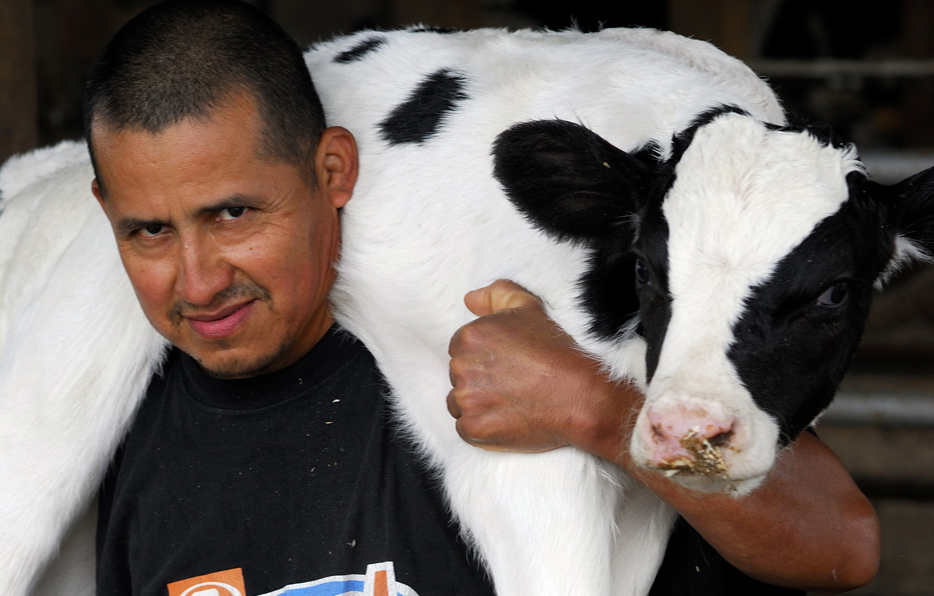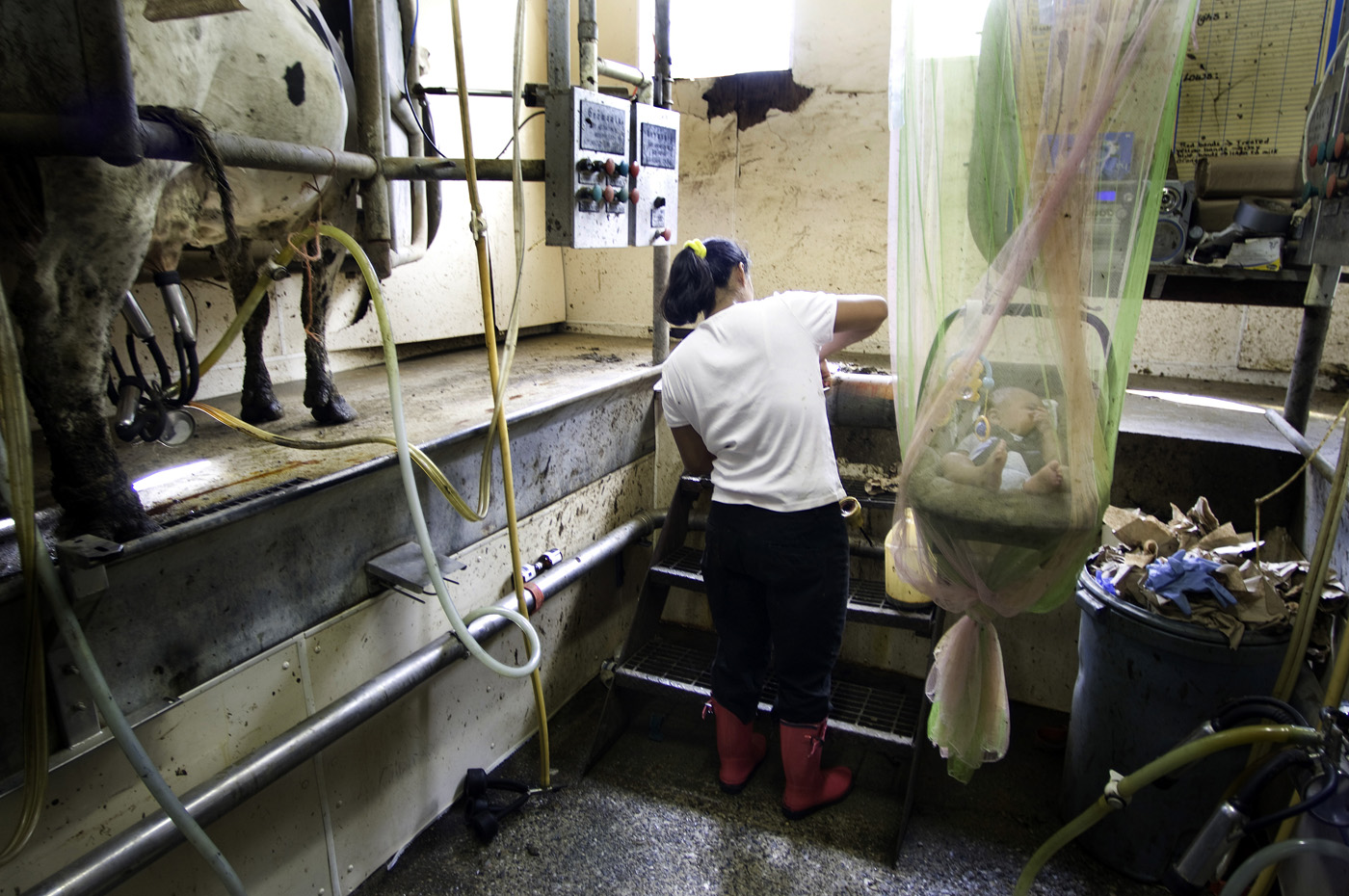About Migrant Justice
"Migrant Justice is a school. Migrant Justice is my family; my brothers and sisters where I find the support I need."
- Alberto Madrigal, Farmworker Coordinating Committee Member

Mission
Our mission is to build the voice, capacity, and power of the immigrant farmworker community to organize for economic justice and human rights. We bring together community members to analyze shared problems and envision collective solutions. Through an ongoing investment in leadership development, Migrant Justice members deepen their skills and knowledge to organize for long-term, systemic change.
History
The seeds of Migrant Justice were planted in 2009 after the death of a young worker, José Obeth Santiz Cruz, on a Vermont dairy farm. Originally from Chiapas, Mexico, the eighteen-year-old was pulled into a mechanized gutter scraper without proper safety equipment and was strangled to death by his own clothing.
This tragedy revealed the existence of a community of approximately 1,200 immigrants living and working on farms around the state, sustaining Vermont’s iconic dairy industry. Hailing primarily from rural communities in southern Mexico and Central America, most dairy workers in the state have been displaced from their home countries by U.S. economic and trade policies and by the impact of climate change. Extreme isolation, and the high risk of detention and deportation, has led to workers feeling like prisoners on their farms.
Exclusion from labor laws, a lack of enforcement of worker’s rights, and corporate control in the dairy industry has led to poor conditions and widespread abuse. Farmworkers generally labor 70+ hours a week, without adequate breaks, for sub-minimum wages. Most workers and their families live in on-farm housing that is often overcrowded and lacking in basic sanitary and safety conditions. Workers face high rates of injuries on the job and lack access to medical care. Sexual harassment, discrimination and violence are pervasive, with many workers unable to speak out for fear of retaliation.
Obeth’s death in 2009 inspired the production of the documentary film Silenced Voices and led to the creation of the collective Vermont Migrant Farmworker Solidarity Project (VTMFSP). It also served as a catalyst for Vermont’s immigrant farmworkers to begin to come together. With support from VTMFSP, farmworkers organized regional assemblies to share food, build community, and discuss the common problems that they faced. Community leaders emerged from each assembly to form a statewide “Farmworker Coordinating Committee.” With the new leadership structure in place, Migrant Justice was born, the first and only organization founded and led by immigrant farmworkers in the state.

Accomplishments
Over the years, the reach of Migrant Justice has grown. We now organize on farms in the neighboring states of New York, New Hampshire, and Maine. Migrant Justice members are also branching out beyond dairy farms to other industries. As the community grows and deepens its roots, Migrant Justice is steadily advancing our agenda for human rights and economic justice.
Some of our accomplishments include:
- Partnering with Vermont Workers’ Center to include undocumented people in Vermont’s 2011 ground-breaking universal health care legislation
- Organizing a powerful network of farmworkers, farmers, and allies to win legislation in 2013 granting all Vermont residents access to driver’s licenses, regardless of immigration status
- Creating and implementing one of the strongest statewide policies in the nation prohibiting racial profiling and stopping the collaboration between local law enforcement and immigration agents
- Mobilizing public support to win the release and stop the deportations of immigrant farmworker leaders targeted and detained by federal immigration authorities
- Achieving successful settlements with the Department of Homeland Security, Immigration and Customs Enforcement, and the Vermont DMV following a First Amendment lawsuit over the agencies’ unlawful targeting of Migrant Justice and its leadership
- Establishing the Vermont Economic Stimulus Equity Fund and directly distributing $2 million to families excluded from Covid relief
- Prohibiting immigration agents from detaining people at or around Vermont courthouses, resulting in the prevention of immigration arrests and expanded access to courts in the state
- Supporting legislation to form Vermont’s Immigrant Health Insurance Program, expanding health care access to pregnant people and children, regardless of immigration status
- Proposing and passing the Education Equity law, making Vermont higher education and financial aid more accessible for immigrant students
- Creating and implementing Milk with Dignity, the first and only worker-driven social responsibility program in the dairy industry, protecting rights and improving conditions for hundreds of farmworkers, and resulting in millions of dollars in economic redistribution from corporations to farmers and farmworkers
Migrant Justice has transformed the lives of the immigrant community in Vermont, leading to changes barely imagined when the organization was formed. Our work has changed the social and political landscape of the state and served as an example for communities around the country in their fights for human rights and economic justice. Migrant Justice has been recognized by a number of awards, including:
- RESIST Foundation's Organization of the Year (2013)
- Vermont ACLU's David Curtis Civil Liberties Award (2013)
- Food Chain Workers Alliance's Food Justice Award (2017)
- Rural Vermont's Jack Starr Award for Outstanding Organization (2017)
- National Education Association's Cesar Chávez Human and Civil Rights Award (2017)
- Discount Foundation Legacy Award (2018)
- National Center for Law and Economic Justice´s Social Justice Advocacy Award (2019)
- Frank Hatch Award for Enlightened Public Service (2021)
__________________________________________________________________
Thanks to Caleb Kenna and Chris Urban for sharing photos from the Golden Cage
